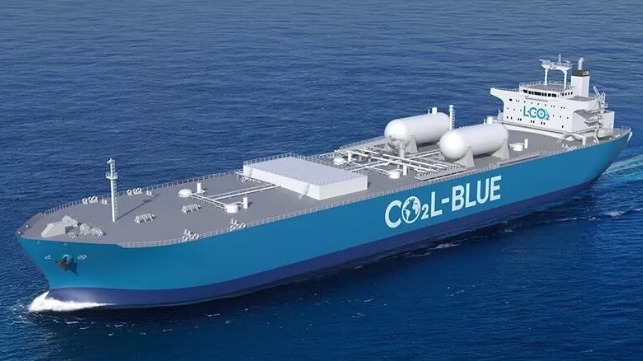Mitsubishi, Mitsui and Nihon Launch Study to Develop LCO2 Carriers

A collaboration involving Japan’s leading shipbuilders along with industrial giants Mitsui and Mitsubishi is looking to advance the development of large ocean-going liquified CO2 carriers as part of the global initiatives for carbon capture and storage. The goal is to lay the groundwork for Japan’s entry into the emerging new segment of the shipping industry.
The new collaboration is being formed between Mitsubishi and Mitsui and building on a similar collaboration launched in May 2023 by Mitsubishi Shipbuilding and Nihon Shipyard, a joint venture established for ship design between Imabari Shipbuilding and Japan Marine United Corporation. Mitsubishi and Mitsui report that they are now advancing business development for the early launch of the carbon capture and storage (CCS) business.
As part of the emergence of the CCS business, the companies expect that there will be increasing demand for vessels able to transport the captured CO2 and deliver it in liquid form either to locations where it can be stored under the sea floor or applications that reuse CO2. Japan’s decarbonization strategy calls for a large component of capture and storage to reach the global goal of net zero emissions.
Utilizing the technologies and construction know-how of Mitsubishi Shipbuilding and Nihon Shipyard, the collaboration will work to establish the construction and production infrastructures of LCO2 carriers and examine consistency with onshore facilities. The companies note that it will be important to standardize the specifications and design of LCO2 carriers across multiple projects as well as develop a realistic production supply chain so that the LCO2 vessels can be constructed.
The four companies look to work together to develop this consistency needed to provide Japan with an early entry into the sector. Working with Mitsui & Co. and Mitsubishi Corporation, they plan to develop standardization of ship specification and design to realize large-scale international transportation from 2028 onwards.
The efforts will draw from experience with other forms of gas carriers as well as research that is already underway. In May 2023, Mitsubishi Shipbuilding and Nihon Shipyard Co. formed a joint venture for the development of an ocean-going LCO2 carrier. In addition, the Japan Organization for Metals and Energy Security (JOGMEC) launched a feasibility study as a public project.

that matters most
Get the latest maritime news delivered to your inbox daily.
Mitsubishi Shipyard completed the construction of the world’s first dedicated LCO2 carrier and delivered the vessel in November 2023. It is a demonstration ship built as part of a project to advance the expertise sponsored by Japan’s New Energy and Industrial Technology Development Organization (NEDO). The ship, which has a capacity of 1,450 cbm of LCO2, is being used for testing to contribute to the development of the market and shipbuilding skills.
Japan looks to compete against both Chinese shipbuilders and South Korean yards which are also pursuing the market. China has the first dedicated commercial LCO2 carriers, smaller vessels designed with two cylindrical cargo tanks with a total capacity of 7,500 cbm of liquid CO2, under construction. A total of four of these vessels are on order to operate with the Northern Lights project in the North Sea. Japan’s “K” Line (Kawasaki Kisen Kaisha) has been contracted to operate those ships. The first two ships will be delivered in 2024.
